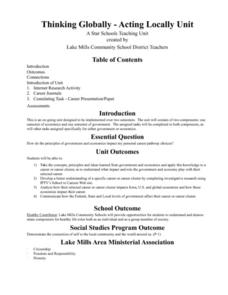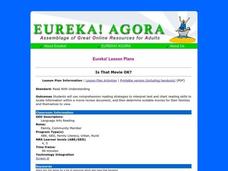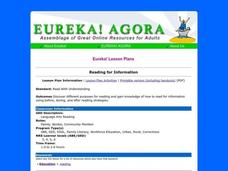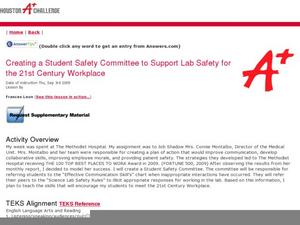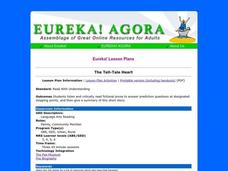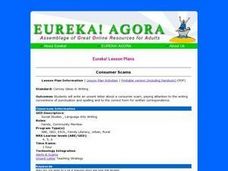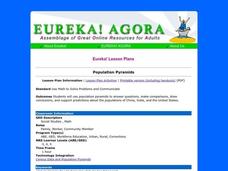Curated OER
Thinking Globally - Acting Locally
Young scholars take concepts, principles and ideas investigated from government and economics and apply this knowledge to a career or career cluster. They use IPTV's School to Careers database to research a possible career. Students...
Curated OER
My Favorite Story
Students share their pictures on an online database. As a class, they discuss their favorite books and why they like it. They review the elements of a story and brainstorm ideas for each category. To end the lesson, they complete a...
Curated OER
The Dead Zone: A Marine Horror Story
High schoolers graph dissolved oxygen versus depth using data taken from NECOP Program. In this marine science lesson, students explain the causes of hypoxia. They recommend possible solutions to this problem.
Curated OER
Is That Movie OK?
Discuss movies and movie enjoyment with your middle school language arts class. They interpret movie review information, determine appropriate movies, and then write film reviews to share with the class. Focus on using context clues to...
Curated OER
Introducing the Memo
Examine the text structure of a memo with this worksheet. Eighth to twelfth graders decide if the purpose of a memo is to motivate an action or to provide information to the reader. They explore new vocabulary and make predictions prior...
Curated OER
Reading for Information
What should readers do to prepare for reading an informational text? What should they do during their reading? What should they do after completing such a text? Introduce your pupils to reading strategies and techniques to gain meaning...
Curated OER
War On Battle of the Books
Learners participate in a statewide Battle of the Books competition. They read books and answer questions about them to earn points for their school.
Curated OER
Earth Day
Third graders utilize technology to access, analyze, interpret and communicate information about Earth Day.
Curated OER
Creating a Student Safety Committee to Support Lab Safety for the 21st Century Workplace
Students create a Student Safety Committee. In this lesson for science lab activities, students discuss the communication skills required to help each other in the science lab. Students analyze their classmates' response to a...
Curated OER
Animal Trading Cards
Students use a computer program to research an animal and practice taking notes. In this animal research lesson, students use PebbleGo database to research their animal and take notes. Students then make an animal trading card using...
Curated OER
Catalase: A Bioinformatics Case Study
Students investigate the physical structure of a protein by using a computer simulation tool. They record its primary amino acid structure while viewing it in three dimensions for a better visual recognition. There is also a comparison...
Curated OER
The Tell-Tale Heart
Readers listen and critically read fictional prose to answer prediction questions at designated stopping points, and then they give a summary of the short story. This lesson is ideal for English language learners developing English...
Curated OER
Convey Ideas in Writing
Write an unsent letter about a consumer scam, paying attention to the writing conventions of punctuation and spelling. This lesson could be adapted to fit a variety of social issues in which letter writing is appropriate. 4
Curated OER
Build a Skittles Graph
Students construct a bar graph with a given set of data. They calculate the ratio and percent of the data. Students discuss alternate ways of graphing the data as well as multiple strategies to approach the task.
Curated OER
Shop 'Til You Drop
Students compare food prices to find the lowest unit price and make choices about where to shop and what to purchase on weekly items, cost comparisons and items needed. They collect grocery ads and weekly sale flyer's to expedite their...
Curated OER
Math! What's It All About?
Students explore what it means to solve problems and communicate in real life situations. They recognize math in a variety of real life materials. Also, they determine what procedures they use to solve a problem and what areas of math...
Curated OER
Population Pyramids
Students utilize population pyramids to answer questions, make comparisons, draw conclusions and support predictions about the populations of China, India and the Unites States. They arrange numbers and symbolic information from various...
Curated OER
Buying on Credit
Students determine how buying on credit adds to the total cost of an item by computing the interest. They find a major item advertised in a magazine and identify the price. Then they identify the rate of a credit card and calculate the...
Curated OER
Managing Medical Conditions
Students investigate more about a medical condition that is of interest to them and write what they have learned about that condition, using the information as a personal resource or to share with others. They record information they...
Curated OER
Party Time
Students engage in a lesson about finding information from the grocery store to put into data that can be measured. The data is found in advertisements and food labels. They plan the cost of a party when using the unit cost of various...
Curated OER
Picture This
Students create a descriptive paragraph conveying ideas utilizing a personal photograph as a prompt for their writing. This concept includes the writers emotions, personal issues, education, art and photography. They share insights to...
Curated OER
Population Pyramids
Students engage in a lesson that is about the concept of measuring the statistical data of a population taken from a census. The data is interpreted and recorded looking for trends in subjects like world economy and job opportunities.
Curated OER
Regions of the United States
Learners present a travelogue, an alternate format to preparing their writing, of a specific U.S. geographic region that includes the aspects of population, climate, landforms, economics, culture, famous people and places and natural...
Curated OER
Scientific Method
Students conduct an experiment and complete a chart demonstrating some of the basic properties and components of water via the scientific method. They encompass strategies such as questioning, making predictions, comparing/contrasting...
